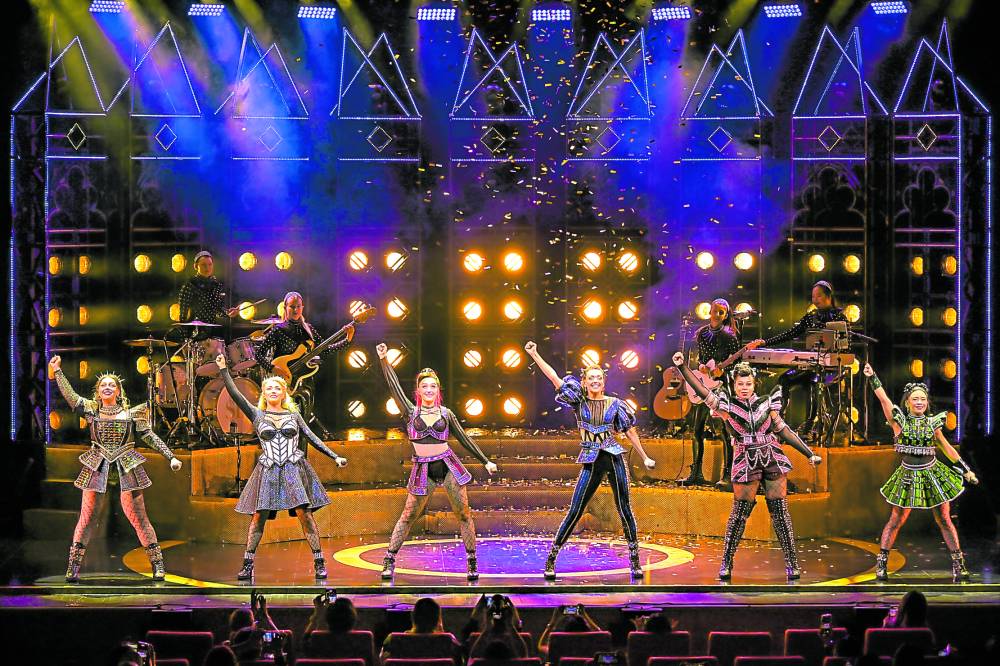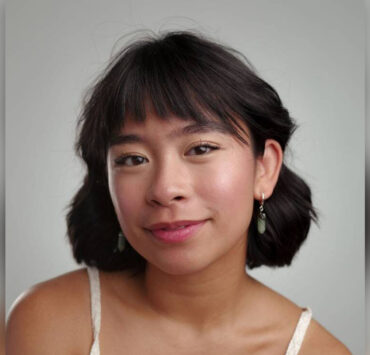When a pop concert becomes a conversation

If pop music is anything—more than being catchy, or accessible, or direct with its emotions—it’s music made for communal experiences. And pop isn’t just a one-sided reflection of the tastes of a mass audience; it’s also where artists bring a diversity of sounds and ideas to be contemplated on by the mainstream.
So rather than simply regurgitating popular styles to appeal to more theatergoers, the British musical “Six” (which played at The Theatre at Solaire until Oct. 20) understands that the genre is a conversation, an exchange of thought, and a space to think of what we allow to be regarded as popular belief.
Presented in the format of a pop concert, the show stars an all-girl singing group consisting of King Henry VIII’s six wives (often remembered solely through the rhyme “divorced, beheaded, died; divorced, beheaded, survived,” in reference to their respective fates), who propose a competition to the audience.
Through song, each of the queens would take turns arguing that they had it worst under their notorious husband—with the winner getting to lead the group. It’s a fun, silly premise that not only blossoms into something much more thoughtful, but becomes a rousing celebration of pop music itself.
Originally performed by university students at the Edinburgh Festival Fringe in 2017, “Six” still carries a scrappy, independent spirit that helps it feel much closer to its audience. Even after moving to the West End in 2019 and Broadway in 2021, the production is still surprisingly smaller-scale—a simple, unchanging stage designed by Emma Bailey, and front-facing concert lighting by Tim Deiling.
This makes it a bit of a gamble to perform, however. Since the production admittedly doesn’t aspire to the meticulous level of theatricality of many pop concerts today, Lucy Moss and Jamie Armitage’s direction depends heavily on how much energy the crowd gives back to the performers. At the Sunday matinee that this writer attended, the audience was slower to warm, which meant some awkward silences as punchlines got lost in cultural translation.
No strict divide
But once the crowd accepts that there isn’t a strict divide between them and these queens (decked out in Gabriella Slade’s glamorous costumes, fit for a group of popstar superheroes), the musical becomes undeniably entertaining, with the performers now able to shift tones as nimbly as if in conversation with friends. It feels like the stage begins to extend to include the audience as part of the show.
And if anybody in the crowd still resists cheering along, the musical score is more than enough to enjoy on its own. Composers Moss and Toby Marlow demonstrate not just an ear for hook-driven songwriting and cheeky wordplay, but their understanding of how every genre within pop adds to the tapestry of women’s expression.
Influences range from the powerful R&B and hip-hop of Beyoncé and Nicki Minaj, to the bittersweet soulfulness of Alicia Keys, to the more overtly sexual style of pop in “All I Wanna Do,” which ultimately comments on the sexual exploitation of young women from any time period.
These songs are performed, of course, by highly anachronistic versions of Henry VIII’s wives—emphasizing how the issues touched upon in “Six” are experienced by women across generations. And while this touring cast doesn’t always come together as a unified ensemble (such as when the queens have to bicker viciously between songs), their individual personalities still contribute to the whole.
In particular, Liberty Stottor’s Jane Seymour becomes the show’s beating, wounded heart through her soaring, Adele-inspired “Heart of Stone.” And Yna Tresvalles’ endlessly watchable Anne Boleyn bounds about the stage like a firecracker, and not just in her pop-punk number “Don’t Lose Ur Head.”
Irreverent
Given how irreverently contemporary this production is, it’s clear that “Six” isn’t interested in being just a history lesson, but also a discussion-starter on how we talk about history, who in history gets to be deemed important, and how we may base importance solely on how much one has suffered.
The musical confesses its difficulty in finding more “positive” historical information about the tragic lives of these queens, and at one point admits that there is no real happy ending to be revealed. But it also remembers that this shouldn’t stop us from neglecting the present—from changing oppressive histories that are being written today, while we still can.
Both history and pop music are subject to trends and dominant forces that can make them seem rigid and narrow. What “Six” somehow manages to do is remind us that both these things are meant to be a constant, ever-growing conversation, and not just a one-sided representation of how a majority of people thinks. And it just happens to accomplish this with great humor, exuberant music, and a hand extended towards us for our participation.

















